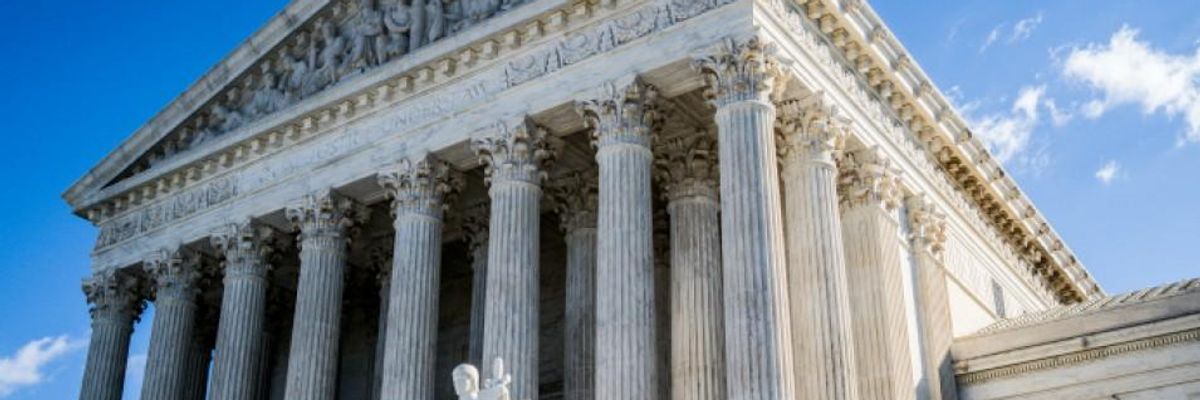
The Supreme Court is hearing its first cases this week since Justice Brett Kavanaugh was appointed to the court. (Photo: Phil Roeder/Flickr/cc)
When It Comes to Climate Crisis and Kavanaugh's First Day on the Supreme Court, "It's Not Very Promising"
"The first entry in Kavanaugh's environmental record as a SCOTUS member is in and it's not very promising."
A day into Brett Kavanaugh's new role as an associate justice on the U.S. Supreme Court, the court ruled in favor of a decision the judge had made while serving on the D.C. Circuit Court of Appeals--allowing a challenge to a greenhouse gas regulation to stand one day after the United Nations warned that "unprecedented" political will is needed to fight the climate crisis.
The Court declined to hear a lawsuit against the appeals court over its ruling last year that struck down an Obama-era regulation on hydrofluorocarbons (HFC).
The greenhouse gases are commonly found in household appliances including air conditioners. While they do not last long in the atmosphere once they're released, HFCs are thousands of times more potent than carbon dioxide and were used widely starting in the mid-1990s as substitutes for ozone-depleting substances.
"Coming only a day after the world's leading climate scientists called for urgent action to curb dangerous carbon pollution, the court's decision lets irresponsible companies to continue harming our planet--even though safer alternatives exist," David Doniger, an attorney at the Natural Resources Defense Council (NRDC), said in a statement.
Kavanaugh was not involved in the decision to dismiss the lawsuit, but critics expressed concern that the ruling is a sign of how the court will likely decide environmental cases in the future.
Last year, the Trump administration argued that the HFC rule was the result of the Environmental Protection Agency (EPA) overstepping its bounds under former President Barack Obama.
The 2015 regulation had eliminated the use of HFCs, identified by the NRDC as "powerful heat-trapping gases that significantly contribute to climate change," and mandated that companies find alternative substances that do not contribute to the climate crisis to use in refrigerators and air conditioners.
Kavanaugh agreed with Trump's EPA, writing in his opinion in the 2-1 ruling that the regulation appeared to "pull the rug out" from under companies that invested in HFCs.
"Under the Constitution, congressional inaction does not license an agency to take matters into its own hands, even to solve a pressing policy issue such as climate change," Kavanaugh wrote.
On Monday, the Guardian reported that a treaty under the Montreal Protocol, the Kigali Amendment, is set to drastically reduce global emissions of HFCs--one of several "short-lived climate pollutants" (SLCPs)--when it goes into effect on January 1. The treaty could reduce the warming of the globe by as much as 0.5 degrees Celsius or 0.9 degrees Fahrenheit.
"Short-lived climate pollutants are the 'low hanging fruit' in the fight against climate change," Helena Molin Valdes, head of the Climate and Clean Air Coalition, said in a statement. "We have the tools and proven technologies and policies to help countries achieve immediate reductions, and by doing so we can solve air pollution and climate simultaneously."
An Urgent Message From Our Co-Founder
Dear Common Dreams reader, The U.S. is on a fast track to authoritarianism like nothing I've ever seen. Meanwhile, corporate news outlets are utterly capitulating to Trump, twisting their coverage to avoid drawing his ire while lining up to stuff cash in his pockets. That's why I believe that Common Dreams is doing the best and most consequential reporting that we've ever done. Our small but mighty team is a progressive reporting powerhouse, covering the news every day that the corporate media never will. Our mission has always been simple: To inform. To inspire. And to ignite change for the common good. Now here's the key piece that I want all our readers to understand: None of this would be possible without your financial support. That's not just some fundraising cliche. It's the absolute and literal truth. We don't accept corporate advertising and never will. We don't have a paywall because we don't think people should be blocked from critical news based on their ability to pay. Everything we do is funded by the donations of readers like you. Will you donate now to help power the nonprofit, independent reporting of Common Dreams? Thank you for being a vital member of our community. Together, we can keep independent journalism alive when it’s needed most. - Craig Brown, Co-founder |
A day into Brett Kavanaugh's new role as an associate justice on the U.S. Supreme Court, the court ruled in favor of a decision the judge had made while serving on the D.C. Circuit Court of Appeals--allowing a challenge to a greenhouse gas regulation to stand one day after the United Nations warned that "unprecedented" political will is needed to fight the climate crisis.
The Court declined to hear a lawsuit against the appeals court over its ruling last year that struck down an Obama-era regulation on hydrofluorocarbons (HFC).
The greenhouse gases are commonly found in household appliances including air conditioners. While they do not last long in the atmosphere once they're released, HFCs are thousands of times more potent than carbon dioxide and were used widely starting in the mid-1990s as substitutes for ozone-depleting substances.
"Coming only a day after the world's leading climate scientists called for urgent action to curb dangerous carbon pollution, the court's decision lets irresponsible companies to continue harming our planet--even though safer alternatives exist," David Doniger, an attorney at the Natural Resources Defense Council (NRDC), said in a statement.
Kavanaugh was not involved in the decision to dismiss the lawsuit, but critics expressed concern that the ruling is a sign of how the court will likely decide environmental cases in the future.
Last year, the Trump administration argued that the HFC rule was the result of the Environmental Protection Agency (EPA) overstepping its bounds under former President Barack Obama.
The 2015 regulation had eliminated the use of HFCs, identified by the NRDC as "powerful heat-trapping gases that significantly contribute to climate change," and mandated that companies find alternative substances that do not contribute to the climate crisis to use in refrigerators and air conditioners.
Kavanaugh agreed with Trump's EPA, writing in his opinion in the 2-1 ruling that the regulation appeared to "pull the rug out" from under companies that invested in HFCs.
"Under the Constitution, congressional inaction does not license an agency to take matters into its own hands, even to solve a pressing policy issue such as climate change," Kavanaugh wrote.
On Monday, the Guardian reported that a treaty under the Montreal Protocol, the Kigali Amendment, is set to drastically reduce global emissions of HFCs--one of several "short-lived climate pollutants" (SLCPs)--when it goes into effect on January 1. The treaty could reduce the warming of the globe by as much as 0.5 degrees Celsius or 0.9 degrees Fahrenheit.
"Short-lived climate pollutants are the 'low hanging fruit' in the fight against climate change," Helena Molin Valdes, head of the Climate and Clean Air Coalition, said in a statement. "We have the tools and proven technologies and policies to help countries achieve immediate reductions, and by doing so we can solve air pollution and climate simultaneously."
A day into Brett Kavanaugh's new role as an associate justice on the U.S. Supreme Court, the court ruled in favor of a decision the judge had made while serving on the D.C. Circuit Court of Appeals--allowing a challenge to a greenhouse gas regulation to stand one day after the United Nations warned that "unprecedented" political will is needed to fight the climate crisis.
The Court declined to hear a lawsuit against the appeals court over its ruling last year that struck down an Obama-era regulation on hydrofluorocarbons (HFC).
The greenhouse gases are commonly found in household appliances including air conditioners. While they do not last long in the atmosphere once they're released, HFCs are thousands of times more potent than carbon dioxide and were used widely starting in the mid-1990s as substitutes for ozone-depleting substances.
"Coming only a day after the world's leading climate scientists called for urgent action to curb dangerous carbon pollution, the court's decision lets irresponsible companies to continue harming our planet--even though safer alternatives exist," David Doniger, an attorney at the Natural Resources Defense Council (NRDC), said in a statement.
Kavanaugh was not involved in the decision to dismiss the lawsuit, but critics expressed concern that the ruling is a sign of how the court will likely decide environmental cases in the future.
Last year, the Trump administration argued that the HFC rule was the result of the Environmental Protection Agency (EPA) overstepping its bounds under former President Barack Obama.
The 2015 regulation had eliminated the use of HFCs, identified by the NRDC as "powerful heat-trapping gases that significantly contribute to climate change," and mandated that companies find alternative substances that do not contribute to the climate crisis to use in refrigerators and air conditioners.
Kavanaugh agreed with Trump's EPA, writing in his opinion in the 2-1 ruling that the regulation appeared to "pull the rug out" from under companies that invested in HFCs.
"Under the Constitution, congressional inaction does not license an agency to take matters into its own hands, even to solve a pressing policy issue such as climate change," Kavanaugh wrote.
On Monday, the Guardian reported that a treaty under the Montreal Protocol, the Kigali Amendment, is set to drastically reduce global emissions of HFCs--one of several "short-lived climate pollutants" (SLCPs)--when it goes into effect on January 1. The treaty could reduce the warming of the globe by as much as 0.5 degrees Celsius or 0.9 degrees Fahrenheit.
"Short-lived climate pollutants are the 'low hanging fruit' in the fight against climate change," Helena Molin Valdes, head of the Climate and Clean Air Coalition, said in a statement. "We have the tools and proven technologies and policies to help countries achieve immediate reductions, and by doing so we can solve air pollution and climate simultaneously."

